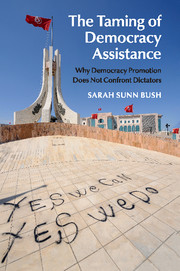Book contents
- Frontmatter
- Contents
- List of figures
- List of tables
- Preface
- List of abbreviations
- Part I Introduction and argument
- 1 Introduction
- 2 The argument: structure, agency, and democracy promotion
- 3 Tame democracy assistance: what it is and why it matters
- Part II Testing the argument
- Part III Conclusions
- Part IV Appendices and references
1 - Introduction
from Part I - Introduction and argument
Published online by Cambridge University Press: 05 May 2015
- Frontmatter
- Contents
- List of figures
- List of tables
- Preface
- List of abbreviations
- Part I Introduction and argument
- 1 Introduction
- 2 The argument: structure, agency, and democracy promotion
- 3 Tame democracy assistance: what it is and why it matters
- Part II Testing the argument
- Part III Conclusions
- Part IV Appendices and references
Summary
I do have an unyielding belief that all people yearn for certain things: the ability to speak your mind and have a say in how you are governed; confidence in the rule of law and the equal administration of justice; government that is transparent and doesn't steal from the people; the freedom to live as you choose. These are not just American ideas; they are human rights. And that is why we will support them everywhere.
The global spread of democracy was among the most remarkable transformations in world politics of the twentieth century. Democracies represented a small minority of the world's states in 1900. Owing to the spread of European fascism, the number of democracies declined further during the interwar years. Although the Allied victory in World War II bolstered democracy once again, the century's largest sustained period of global democratization began in Portugal in 1974. The “third wave” of democratization swept across states in every region of the world other than the Middle East. As of 2014, over half the world's states are electoral democracies.
The third wave of democratization coincided in part with the end of the Cold War and a stunning shift toward democracy promotion in the foreign policies of the world's advanced democracies. The United States led the charge. Presidents since at least Woodrow Wilson have proclaimed the United States’ commitment to aiding democracy abroad. For years, however, the realpolitik of security and foreign economic interests overwhelmed idealpolitik. Cold War worries encouraged the United States to ally with autocracies and even support the overthrow of democratically elected governments in a few ignominious instances. Today, the United States continues to prize its relationships with certain dictators, especially in the “war on terror.” But although the United States is far from a universal or selfless advocate of democracy, the rise of democracy promotion has fundamentally altered how American leaders make foreign policy in many countries.
- Type
- Chapter
- Information
- The Taming of Democracy AssistanceWhy Democracy Promotion Does Not Confront Dictators, pp. 3 - 21Publisher: Cambridge University PressPrint publication year: 2015



